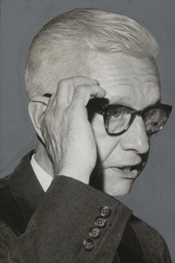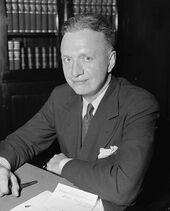Francis Walter
 From Conservapedia
From Conservapedia | Francis Eugene Walter | |||
|---|---|---|---|
| |||
| Former U.S. Representative from Nevada's 15th Congressional District From: January 3, 1953 – May 31, 1963 | |||
| Predecessor | Alvin Busyh | ||
| Successor | Fred B. Rooney | ||
| Former U.S. Representative from Nevada's 20th Congressional District From: January 3, 1945 – January 3, 1953 | |||
| Predecessor | Leon H. Gavin | ||
| Successor | James E. Van Zandt | ||
| Former U.S. Representative from Nevada's 21st Congressional District From: March 4, 1933 – January 3, 1945 | |||
| Predecessor | J. Banks Kurtz | ||
| Successor | Chester H. Gross | ||
| Information | |||
| Party | Democrat | ||
Francis Eugene Walter (May 26, 1894 – May 31, 1963) was a Democrat U.S. representative from Pennsylvania who served from the 1930s to the 60s in the House. He is mostly remembered for his influence on U.S. immigration laws, having sponsored the Immigration and Nationality Act of 1952 along with Nevada senator Pat McCarran.
He chaired the House Committee on Un-American Activities from 1955 up until his death in 1963.
U.S. House of Representatives[edit]
Walter voted in favor of the 1937 anti-lynching bill.[1] He voted "present" on the Civil Rights Act of 1957[2] though supported the Civil Rights Act of 1960.[3]
On immigration, Walter worked on the House version of the Immigration and Nationality Act of 1952 which slashed race/ethnicity based restrictions for naturalization in addition to allowing for easier deportations of illegal aliens and enforcing anti-Communist measures. It was vetoed by President Harry Truman, which was overridden in Congress and passed. Japanese Americans at the time in particular were divided over the legislation, with some praising it for it's modifications to naturalization laws while others opposed it over certain portions of the bill.
In 1953, New York representative Emanuel Celler called for further changes to U.S. immigration laws to ensure equal admission of immigrants regardless of race or ethnicity, Walter opposed him in what he called "professionals including professional Jews shedding crocodile tears."
Walter had feuded with The New York Times,[4] which published editorial comments opposing him.[5]
He died in office in 1963.[6] Two years later, Rep. Celler and Sen. Philip Hart of Michigan introduced the Immigration and Nationality Act of 1965, which passed and replaced the McCarran-Walter Act.
References[edit]
- ↑ TO PASS H. R. 1507, AN ANTI-LYNCHING BILL.. GovTrack.us. Retrieved April 22, 2021.
- ↑ HR 6127. CIVIL RIGHTS ACT OF 1957.. GovTrack.us. Retrieved April 22, 2021.
- ↑ HR 8601. CIVIL RIGHTS ACT OF 1960. APPROVAL BY THE HOUSE OF THE SENATE'S AMENDMENTS.. GovTrack.us. Retrieved April 22, 2021.
- ↑ Walter, Francis E. (October 17, 1954). Banning Visiting Aliens; Administrators' Failure to Exercise Discretionary Powers Charged. The New York Times. Retrieved April 22, 2021.
- ↑ Walter, Francis E. (February 11, 1961). Admitting Refugees; Legislation Facilitating Entry of Displaced Is Upheld. The New York Times. Retrieved April 22, 2021.
- ↑ Rep. Francis Walter, 69, Dies; Wrote Immigration Restrictions; Un-American Activities Panel Chief a Power in House-- Often Balked Presidents Opposed by Presidents Once Heir to Speaker Alienated Churchmen. The New York Times. Retrieved April 22, 2021.
External links[edit]
Categories: [Pennsylvania] [Former United States Representatives] [Democrats] [Civil Rights] [Immigration] [Anti-Communism]
↧ Download as ZWI file | Last modified: 02/14/2023 03:17:03 | 22 views
☰ Source: https://www.conservapedia.com/Francis_Walter | License: CC BY-SA 3.0
 ZWI signed:
ZWI signed:

 KSF
KSF